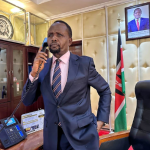United States Secretary of State Antony Blinken is set to begin a two-day visit to Haiti on Thursday to strengthen support for the UN-backed Multinational Security Support (MSS) mission in the country.
During his visit, Blinken will meet with Transitional Presidential Council Coordinator Edgard Leblanc Fils and Prime Minister Garry Conille. Their discussions will focus on the next steps in Haiti’s democratic transition, US support for humanitarian aid, and stabilization efforts led by Haitians.
Blinken is also scheduled to meet with the leadership of the MSS mission, which includes Kenya’s Godfrey Otunge, the force commander overseeing a contingent of around 400 security officers from Kenya’s National Police Service. Kenya plans to deploy at least 1,000 officers to Haiti.
The meetings highlight the US’s commitment to restoring security in Haiti while emphasizing the importance of human rights. However, Blinken’s visit comes amid concerns from the officers and their families in Kenya about delayed salary payments.
As of August 25, it had been two months since the officers arrived in Haiti, with the first team landing on June 25 and the second on July 16. The officers, who were initially unpaid, are now receiving their salaries.
Each officer is expected to earn an additional Sh100,000 on top of their regular salaries. The mission, supported by the UN with significant contributions from the US, recently received 24 new APCs for their operations.
US Assistant Secretary of State for Western Hemisphere Affairs Brian Nichols said recently that they are looking at several options, including a formal UN peace-keeping operation, that could help ensure the mission has reliable financing and staffing going forward.
Blinken will also visit the Dominican Republic to meet with President Luis Abinader.
“In Santo Domingo, Blinken and Abinader will reinforce our close and longstanding partnership, and discuss collaboration to advance inclusive economic growth and champion human rights,” said Miller.
The talks will also include the promotion of good governance, security, and climate resilience in the region, including through the US-Caribbean Partnership to Address the Climate Crisis (PACC 2030) and the Caribbean Basin Security Initiative (CBSI).


